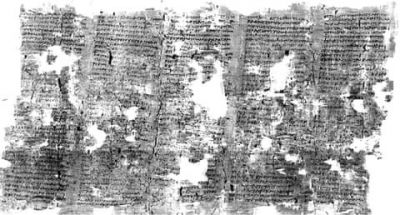Un rotolo di papiro sepolto sotto le ceneri dell'eruzione del Vesuvio può aiutare gli storici a comprendere le ultime ore della vita di Platone. Gli archeologi hanno deprecato il rotolo e hanno potuto leggere ciò che era scritto. Platone fu una figura molto influente nella filosofia occidentale. In una scoperta rivoluzionaria, l'antica pergamena conteneva una narrazione di Platone e di come trascorse la sua ultima serata. Il passaggio descrive che Platone ascoltò la musica suonata sul flauto di una schiava. Nonostante la febbre e l'essere nelle ultime ore della morte, la pergamena spiegò che Platone ascoltò la musica e disse che la schiava non ebbe ritmo. Le parole decodificate suggeriscono che Platone fu sepolto nel suo giardino dell'Accademia d'Arte, la prima università del mondo. Platone fondò l'università ed è ancora situata vicino al Mouseion. Inizialmente, si pensava che Platone fosse sepolto all'interno dell'Accademia. In una presentazione alla Biblioteca Nazionale di Napoli, il professor Graziano Ranocchio, dell'Università di Pisa, ha descritto come il ritrovamento di questa pergamena aiuti a comprendere la storia antica e si aggiunga alle informazioni già note. Platone era uno studente di Socrate e un'ispirazione per Aristotele.
Newly deciphered passages from a papyrus scroll that was buried beneath layers of volcanic ash after the AD79 eruption of Mount Vesuvius may have shed light on the final hours of Plato, a key figure in the history of western philosophy. In a groundbreaking discovery, the ancient scroll was found to contain a previously unknown narrative detailing how the Greek philosopher spent his last evening, describing how he listened to music played on a flute by a Thracian slave girl. Despite battling a fever and being on the brink of death, Plato – who was known as a disciple of Socrates and a mentor to Aristotle, and who died in Athens around 348BC – retained enough lucidity to critique the musician for her lack of rhythm, the account suggests. The decoded words also suggest Plato’s burial site was in his designated garden in the Academy of Athens, the world’s first university, which he founded, adjacent to the Mouseion. Previously, it was only known in general terms that he was buried within the academy. In a presentation of the research findings at the National Library of Naples, Prof Graziano Ranocchia, of the University of Pisa, who spearheaded the team responsible for unearthing the carbonised scroll, described the discovery as an “extraordinary outcome that enriches our understanding of ancient history”.
{mprestriction ids="*"}



